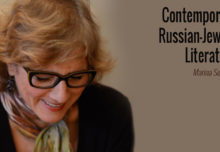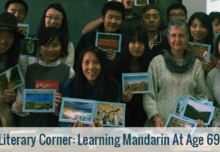Accepting the Challenge: Learning Mandarin
Written by Ilana Shapira
Growing up in Israel I was accustomed to hearing many languages. I developed a great interest in languages and the culture associated with them. As an adult, my professional life is in the field of Applied Linguistics – the art of teaching foreign languages, specifically Hebrew.
If someone would have told me couple of years ago that the next language I would learn at the age of 54 would be Mandarin—a language that is recognized as one of the hardest languages to learn—I would have laughed!
Six months ago I was accepted in a Doctor of Modern Language program at Middlebury College in Vermont, USA. Students in this program are required to experience the learning of a foreign language in an 8-week immersion course which will serve as a foundation for research.
I have lived in Vancouver for the last four years; my first thought was that I wished to learn Mandarin. I wanted to be able to read the signs, to communicate with my neighbors and to better understand the Chinese culture. But, I listened to my fears and those of my friends and colleagues and registered for the Spanish program. Shortly afterwards, my two adolescent daughters commented that I made my decision based on fear and not based on interest. I knew then that I must learn Mandarin. When the coordinator of the Chinese immersion program tried to discourage me, by telling me that learning Mandarin at the age of 54 might not be a good idea, I became even more determined.
For a couple of months, I familiarized myself with the language by watching some on-line lessons and by meeting periodically with a Mandarin teacher to learn Pinyin, a phonetic system that is used to teach Mandarin, (the conversion of Chinese characters to Latin letters, as well as the four tones in Mandarin). Gradually, I felt more confident and I looked forward to starting the summer program.
The Pledge Ceremony took place immediately upon arrival. From that moment on we were to communicate with our teachers and other students only in Mandarin. This meant that I played “Charades” for the first week. I soon found out that most of the students in my class are “heritage learners,” meaning children of parents who speak Mandarin at home.
Others were living with a partner who speaks Mandarin, or they were students who needed to repeat their first year beginner course. Furthermore, all that I had learned previously was covered in the first two days of class. It was the most challenging academic experience I have ever had.
One of the main reasons is cultural differences. The Chinese people believe that the key to success is the combination of hard work (measured by quantity) and perseverance. This leads to two main pedagogical implications:
(a) Assigning students a huge amount of homework and tests. We had 7 teachers who spoke in four different dialects. In the first week we learned 90 new words in Pinyin and 20 grammatical rules. We memorized a list of 20 “emergency sentences” and had a two-hour written test in Mandarin, a two hour listening test and an oral test. Our teacher repeatedly said to us, “A good student study more and sleep less” and whenever they saw us after class hours they would ask: “Did you sleep?”
(b) The teaching method was based on repetition and reciting of single and compound sentences based on listening only. There was no consideration of alternate teaching methods, e.g. visual learners, those who learn better seeing things written down.
Despite the great challenges, with each small achievement, whether I did better on a test or I was able to communicate with my classmates or teacher in the cafeteria, I felt a great sense of achievement. By the third week, I was able to talk about myself and about my family is a short speech in front of all 140 students and teachers, (even though I wasn’t able to sleep the night before). I felt a great sense of accomplishment and knowing that my family was watching the video of me speaking Mandarin in public was an incredible feeling. I have learned that embracing a challenge is empowering regardless of how big or intimidating it might be and regardless of one’s age. These days I continue to learn Mandarin (by choice, not for my degree) and every time I exchange few sentences in Mandarin with any of my neighbors or read a sign on the street, I feel uplifted and empowered.





